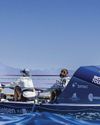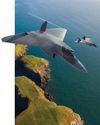You Can’t Just Fly Up Into Space Willy-nilly. A Smart Space Tourist Understands How To Get There. The Ceo Of Spacex Explains Some Of The Science Behind His Stainless-steel Starship Rocket—which Might Just Carry You To Mars.

IN JANUARY, we ran an exclusive interview with Elon Musk on PopularMechanics .com, in which he explained, for the first time, his full thinking—and the complex engineering questions—behind his decision to construct SpaceX’s Starship rocket and booster with stainless steel. The previous design for the rocket (which was then known as the BFR) had called for carbon fiber, but Musk recalculated and went with steel due to its durability, cost-effectiveness, and ductility.
Here, in a continuation of that interview, Musk goes deep on what it takes to actually travel beyond orbit and into space. Also, it sounds like Mars will have a nice park.
Ryan D’Agostino: What don’t most future potential space tourists understand about the practicality of traveling to space?
Elon Musk: Some basic concepts about orbit and gravity, which are counterintuitive because they’re not what we experience. Like, a lot of people think if you go up high enough, gravity stops. This is not true. Earth’s gravitational reach is infinite. You could be at the other side of the universe— given enough time, if you have no relative velocity compared to the Earth, you will come right back to Earth.
The simple Newtonian formula for gravity is GMM over R squared—you know, gravitational constant times the two masses divided by the distance from the centroids. So if you were to go up 100 miles, you’re not changing the distance between you and the center of the Earth very much. The pull of gravity would seem the same to you. The reason there’s this thing called zero gravity, or microgravity—it’s really due to zooming around the Earth very fast. A rocket doesn’t go straight up. It does this arc. It only goes vertical briefly and then turns over and accelerates horizontal to the surface of the Earth.
Bu hikaye Popular Mechanics dergisinin April 2019 sayısından alınmıştır.
Start your 7-day Magzter GOLD free trial to access thousands of curated premium stories, and 9,000+ magazines and newspapers.
Already a subscriber ? Giriş Yap
Bu hikaye Popular Mechanics dergisinin April 2019 sayısından alınmıştır.
Start your 7-day Magzter GOLD free trial to access thousands of curated premium stories, and 9,000+ magazines and newspapers.
Already a subscriber? Giriş Yap

ONE OF THE 'GREATEST THREATS' TO THE PACIFIC NORTHWEST ISN'T WHAT YOU THINK.
EXPERTS ARE PREPARING THE REGION AGAINST THE THREAT OF DANGEROUS VOLCANIC MUDFLOWS, KNOWN AS LAHARS, WHICH COULD INUNDATE THE COMMUNITIES SURROUNDING MT. RAINIER IN AS LITTLE AS 30 MINUTES.

THE WORLD'S TOUGHEST ROW
They rowed 3,000 miles across the Atlantic, battling unpredictable weather, chaotic seas, and finicky equipment. But what they discovered gave them profound new insights into the power of the ocean.

HOW TO DIY OFF-GRID SOLAR
SPEND THE TIME UP FRONT AND PLAN IT CAREFULLY TO AVOID DISAPPOINTMENT

Are We on the Verge of an ARMS RACE in SPACE?
RUMORS OF A RUSSIAN SPACE NUKE, ALONG WITH OTHER SATELLITE-TARGETING WEAPONS, HAVE MADE GEOPOLITICAL TENSIONS EXTEND INTO ORBIT.

Fresh Fingerprints on an Ancient Statue
A CLAY FIGURINE HAS SPENT MILLENNIA incomplete, waiting at the bottom of a lake for its long-dead craftsman to finish the Iron Age-era statuette.

Quantum Entanglement in Our Brains
IT HAS LONG BEEN ARGUED THAT THE human brain is similar to a computer. But in reality, that's selling the brain pretty short.

The Tools of Copernicus
WAY BACK IN 1508, WITH ONLY LIMited tools at his disposal, Nicolaus Copernicus developed a celestial model of a heliocentric planetary system, which he described in hist landmark work De revolutionibus orbium coelestium. It was a complete overhaul of our conception of the universe-one that, unfortunately, earned him the ire of the Catholic church for decades after his death-and forever changed the way we look at the stars.

Building a Sixth-Generation Bomber Raptor
THE GLOBAL COMBAT AIR Programme (GCAP)-a project by the U.K., Italy, and Japan to develop a sixth-generation stealth fighter-has been busy at the drawing board reshaping its vision of the future of air warfare. And judging by the new concept model unveiled at this year's Farnborough air show, that future has big triangular wings.

The Electroweak Force of the Early Universe
TODAY, THE UNIVERSE AS WE KNOW IT IS governed by four fundamental forces: the strong nuclear force, the weak nuclear force, electromagnetism, and gravity.

This Ancient Fossil With a Brain and Guts
WE KNOW WHAT FOSSILS LOOK like. For example, typical dinosaur fossils are bones turned to stone and preserved from the passage of time, located, if we're particularly lucky, in large collections that can be reassembled to represent the beast they used to prop up in their entirety.